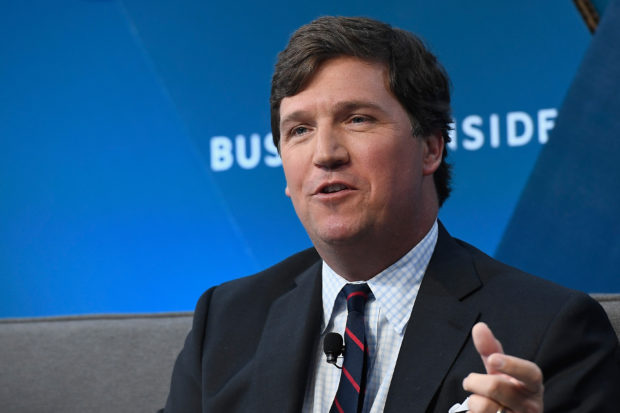Fox News host Tucker Carlson responded to a question from Washington Post media critic Erik Wemple by calling him a “shallow, left-wing moron.”
Wemple, a frequent “Tucker Carlson Tonight” critic, took issue with Carlson’s controversial Wednesday night segment and wrote a commentary for WaPo relating Carlson’s discussion points.
During the Wednesday segment of his show, Carlson detailed declining income opportunities for men and the impact it has in weakening marriage as an institution, given that women historically tend to marry men who make more money than they make themselves.

Tucker Carlson, host of “Tucker Carlson Tonight” speaks onstage at IGNITION: Future of Media at Time Warner Center on November 29, 2017 in New York City. (Photo by Roy Rochlin/Getty Images)
Wemple’s article also references Carlson’s Thursday night segment, quoting the Fox News host and his guest— author Heather MacDonald — with whom Carlson discussed the controversy surrounding his previous day’s statements, attempting to refute only what Wemple assumed to be Carlson’s contention that sexism was only “alleged” in the 50s. (RELATED: ‘Those People Got Very Angry’ — Tucker Rips ‘The View,’ Other Critics Of His Marriage Segment)
Then, The Washington Post columnist ended with a paragraph detailing his attempt to email Carlson about the issue, which included a portion of the Fox News host’s response.
When we first read that contention on identity, we emailed Carlson to see if he’d floated the notion with any of his female colleagues at Fox News. How did they respond? We also asked about the example of Supreme Court Justice Ruth Bader Ginsburg and her legendary — perhaps counterproductive — commitment to work. Carlson wrote back via email, “It’s not a matter of asking female co-workers, you shallow left-wing moron. It’s social science. Are men or women more likely to commit suicide after becoming unemployed? That’s the clearest measure I can give you. Not that you care. Remarkably, you still have a job.”
Interestingly, Wemple didn’t attempt to refute Carlson’s point, that men are “more likely to commit suicide after becoming unemployed.” Yet, there are plenty of studies, including this one reported on by the U.K. Independent in 2015 that linked the spike in male suicides to the recession in Great Britain.
The male suicide rate was more than three times higher than the female rate, with 19 deaths per 100,000 people, compared with 5.1 for women. While female suicide rates have remained stable, the male rate was the highest in 12 years. Men aged between 45 and 59 had the highest rate of suicide at 25.1 per 100,000.


